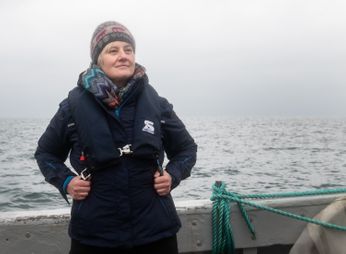
In a decisive step that turns data into action, Trinity College Dublin has unveiled its new Climate Gateway—a comprehensive portal that brings together research, resources, and community efforts aimed at reducing emissions, improving resilience, and guiding policy. The initiative responds to overwhelming evidence that the planet is warming fast, to public urgency for change, and to the need for coordinated strategies that combine science, technology, and local engagement.
Exporting Climate Science into Policy and Practice
For three decades, Professor Karen Wiltshire and her colleagues have measured the realities of a warming world with precision—from rising CO₂ levels in Antarctic ice cores to the disappearance of species at the edges of changing ecosystems. The evidence is clear: the severe consequences of inaction are already unfolding, from expanding heatwaves to shrinking freshwater stocks.
Trinity’s Climate Gateway aggregates these findings into user‑friendly dashboards, policy briefs, and interactive tools that translate complex data into actionable information. By making research accessible to policymakers, businesses and local communities, the gateway reduces the gap between evidence and decision-making.
Data‑driven Roadmaps for Carbon Reduction
The portal hosts scenario models that show the impact of different mitigation pathways on Ireland’s emissions, temperature rise, and economic outcomes. Stakeholders can explore what it would take to meet the Paris Agreement’s 1.5°C target, adjust building codes, or expand renewable energy deployment in real time. Such tools help decision-makers understand the costs and benefits of specific policies before they are rolled out.
Resilience Planning for Climate‑Sensitive Regions
Separate modules address sea‑level rise, drought frequency, and extreme weather events. By overlaying climate projections with geographic risk maps, local councils can identify vulnerable coastal towns, plan infrastructure upgrades, and formulate emergency response protocols. The data show that Ireland’s west coast, including places like Dingle, faces the greatest risk of coastal inundation and that early adaptation can reduce long‑term costs.
Turn the Tide on Climate Migration
Climate migration is no longer a speculative future scenario. Rising sea levels and intensified storms force communities to relocate, creating demand for climate refugees. Rather than politicizing this trend, Trinity’s gateway offers analysis on the drivers of migration, the socioeconomic pressures on host regions, and the legal frameworks that can support responsible integration.
Economic and Social Benefits of Inclusive Migration Policies
Studies included in the gateway demonstrate that incorporating skilled migrants—who often bring renewable energy expertise and entrepreneurial vigor—boostes host economies. Moreover, inclusive policies reduce the likelihood of conflict, fostering social cohesion while benefiting from the diversification of labor markets.
Mobilising Communities: From Demonstrations to Daily Action
Public engagement is a core pillar of the Climate Gateway. Beyond academic discourse, it seeks to empower citizens to adopt sustainable habits, influence local policy, and support green enterprises. The portal lists actionable steps such as:
- Calculating personal carbon footprints using the on‑site tool.
- Finding local recycling and compost programs.
- Discovering city‑wide renewable energy plans.
- Participating in community tree‑planting days.
These practical actions turn curiosity into measurable impact, building a network of individuals who collectively drive climate solutions.
What Trinity Is Doing On the Ground
Beyond the digital platform, Trinity College Dublin engages in concrete research and community projects. The university’s Climate Change Office collaborates with:
- Government agencies to refine national emission targets.
- Local businesses to pilot carbon‑neutral supply chains.
- Non‑profits to promote climate‑smart agriculture in rural areas.
- Schools to integrate climate education into curricula.
These partnerships illustrate that solving climate problems requires a broad coalition of academia, industry, and civil society.
Case Study: The Dingle Hub
One notable example is the Dingle Hub, a community‑led initiative that combines renewable energy projects with sustainable tourism. The project demonstrates how small towns can generate clean power for local use, reduce travel emissions, and attract eco‑tourists—all while preserving cultural heritage.
Climate Action Requires the Soft Power of Research
Many climate narratives are dominated by alarmist imagery, but science teaches us that adaptation is as important as mitigation. By presenting data in a digestible format, Trinity’s Climate Gateway equips decision‑makers to craft policies that are both bold and practical. When scholars communicate directly with communities and policymakers, the chain of knowledge closes fast, leading to more swift, actionable responses.
Prompting Informed Conversation
Trinity’s portal encourages engagement through discussion forums, webinars with climate experts, and environmental journalism. These interactive spaces let participants ask questions and receive evidence‑based answers, breaking down the barrier that often separates academic findings from public discourse.
Why Your Involvement Matters
Climate change is a global challenge that requires participation from every sector. Whether you are a student, a policymaker, a business leader, or a citizen, the tools at your disposal can produce concrete results. The Climate Gateway stands as a platform that transforms data into action, inviting all stakeholders to contribute to collective solutions.
Next Steps
To harness the capacity of Trinity’s new Climate Gateway, consider the following actions:
- Explore the emissions scenarios and identify opportunities in your field.
- Participate in local community projects and disseminate what you learn.
- Support research initiatives that feed the gateway’s data collection.
By aligning individual and collective efforts with the gateway’s evidence, society moves closer to a climate‑resilient future.
Call to Action
If you are ready to move beyond awareness and begin shaping sustainable outcomes, explore the Climate Gateway offered by Trinity College Dublin. It provides a reliable, data‑based foundation for anyone looking to contribute to climate action—whether you are drafting policy, joining a community project, or simply reducing your own carbon footprint. Discover the Climate Gateway here.
For students and professionals seeking advanced study, Trinity offers programs in Climate Science and Sustainability that build on the research presented through the gateway. Explore educational pathways with Trinity College Dublin.
Stay informed about ongoing initiatives and partner with Trinity to integrate climate considerations into your organization. Join the community of climate action partners today.

